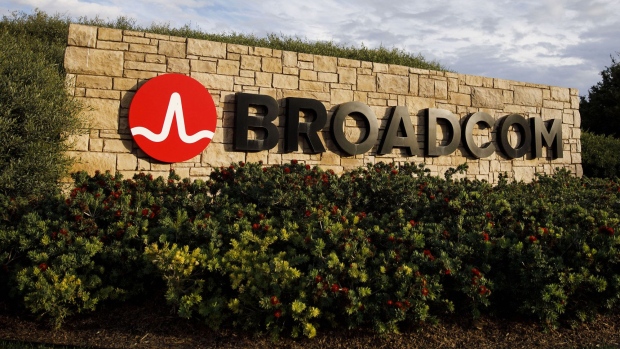Dec 12, 2019
Broadcom gives upbeat 2020 forecast, sees chip improvement
, Bloomberg News

Broadcom Inc. gave an upbeat sales forecast for the next 12 months, signaling optimism that the chip industry has weathered the worst of the China-U.S. trade war and doesn’t expect a further hit to demand.
Sales in fiscal 2020, which ends next November, will be US$25 billion, plus or minus US$500 million, the company said Thursday in a statement. The prediction from the company includes revenue from its purchase of a Symantec Corp. unit. According to three reports from analysts who included a contribution of about $2 billion from that deal, total annual revenue was expected to range from US$23.7 billion to US$25.6 billion. The stock gained as much as 2.8 per cent in extended trading.
Chief Executive Officer Hock Tan has been among the most vocal chip-industry leaders in calling out the impact of the dispute between the world’s two largest economies. Tan has built his company into one of the biggest in the semiconductor business through a string of acquisitions, and is now expanding into software. That gives Broadcom one of the widest reaches in technology, with clients including Apple Inc. and Samsung Electronics Co. in smartphones and some of the top data-center operators for networking components.
“We continue to believe that our core semiconductor business is bottoming and will return to year over year growth in the second half of our fiscal year,” Tan said in the statement.
Sales in the fiscal fourth quarter of 2019, which ended Nov. 3, rose 6.1 per cent to US$5.78 billion, the San Jose, California-based company said. Before certain items, profit was $5.39 a share. That compares with average analyst estimates for per-share profit of US$5.38 on sales of US$5.73 billion, according to data compiled by Bloomberg.
Broadcom’s market value has swelled to US$130 billion following Tan’s spree of deals, including his purchase of Symantec’s enterprise security business for US$10.7 billion last month. A big chunk of the company’s products are used in China or sent through factories there on the way to becoming part of electronic devices sold around the world. Huawei Technologies Co., a Chinese equipment maker that has been called a security threat and was cut off from U.S. suppliers by the Trump administration, previously spent hundreds of millions of dollars a year on Broadcom chips.Tan trimmed Broadcom’s revenue predictions earlier this year, shaving US$2 billion from his original projections, citing declining orders amid the trade dispute. That’s made Broadcom’s stock a laggard. Its 29 per cent gain this year compares with a 56 per cent advance by the Philadelphia Stock Exchange Semiconductor Index.





